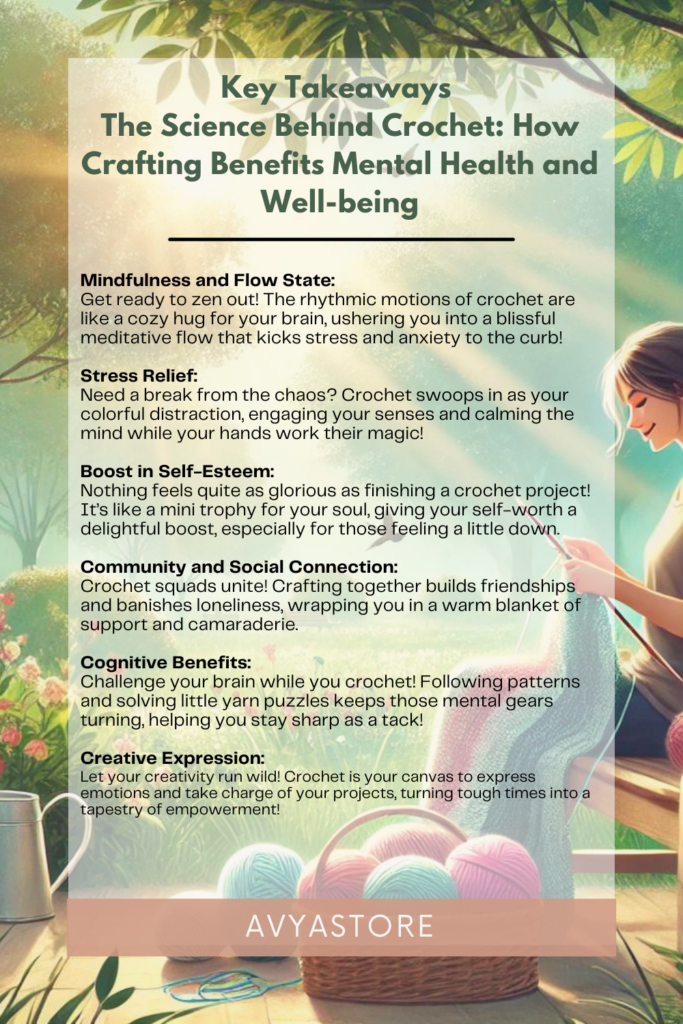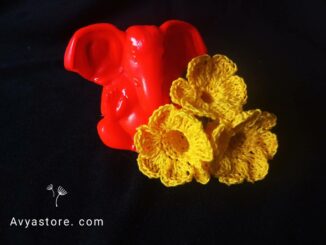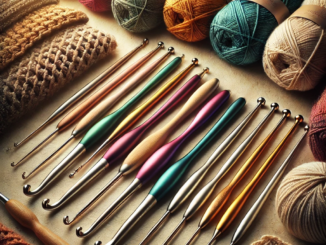In a world where mindfulness and mental health have taken center stage, we often seek ways to calm our minds, relieve stress, and feel a sense of fulfillment. One increasingly popular practice that’s gaining attention for its therapeutic benefits is crochet. This age-old craft, once seen as a simple pastime, is proving to be much more. The intricate and rhythmic process of crocheting holds surprising mental health benefits, backed by science.

So, what exactly is it about crochet that makes it so good for our mental health? Let’s explore.
1. Mindful Repetition and the Flow State
At its core, crochet is an activity of repetition. From making simple stitches to more complex patterns, the act of looping yarn around a hook creates a gentle, rhythmic motion that can be almost meditative. This repetitive action encourages a flow state, a psychological term for being fully immersed and focused in an activity.
When in this flow state, your brain naturally shifts to a calm, meditative space. It’s like pressing a mental pause button. This can significantly lower stress and anxiety levels. Studies have shown that repetitive movements, like those in crochet, increase serotonin, the brain’s “feel-good” chemical. So, not only are you making something beautiful, but your brain is quietly rewarding you with calmness and satisfaction.
2. Stress Relief and Lowering Anxiety
It’s no secret that engaging in creative activities helps relieve stress, and crochet is no exception. One way crochet helps reduce anxiety is by providing a healthy distraction. When you’re focused on counting stitches and perfecting your rows, it’s harder for negative thoughts and worries to take over.
Additionally, the tactile nature of crochet is soothing. The feeling of soft yarn between your fingers, the sound of the hook moving through loops—it all adds up to a sensory experience that can calm your nervous system. This process taps into mindfulness, a practice known for reducing anxiety, because it anchors you to the present moment.
3. A Boost in Self-Esteem and Accomplishment
There’s something deeply satisfying about finishing a crochet project. Whether it’s a scarf, a cozy blanket, or an intricate doily, each completed piece brings a sense of accomplishment. This sense of achievement is key to improving mood and mental well-being.
For individuals struggling with depression or low self-esteem, crochet can provide a much-needed boost. Setting small, manageable goals—like finishing a row or completing a simple project—can foster a sense of purpose and capability. Over time, these little victories build up, helping to increase self-worth.
4. Social Connections and Building Community

While crochet can be a solitary activity, it also brings people together. Crochet circles, clubs, and online crafting communities have sprung up, allowing people to share their projects, patterns, and tips. These social interactions can improve mental well-being by reducing feelings of loneliness and isolation, which are often contributors to anxiety and depression.
Engaging in these groups also offers a sense of belonging, and being part of a community is essential for emotional health. Whether you’re teaching someone a new stitch or simply admiring someone else’s work, the social bonds formed through crochet can foster friendships and support networks.
5. Cognitive Benefits and Brain Health
Believe it or not, crochet isn’t just good for emotional well-being—it’s also a workout for your brain. The act of following patterns, counting stitches, and visualizing the end result involves problem-solving and memory recall, keeping your brain active and engaged.
In fact, researchers have found that engaging in crafting activities like crochet can help reduce the risk of cognitive decline as we age. The process of learning and mastering new stitches, adapting to patterns, and improving technique continually challenges the brain, keeping it sharp.
6. Creativity as Self-Expression

Crochet is an outlet for creativity, and creativity is vital for mental health. Expressing yourself through colors, textures, and designs offers an opportunity to release emotions and thoughts that might otherwise be difficult to articulate. Whether you’re creating something abstract or practical, the act of making something uniquely yours can be deeply therapeutic.
This creative freedom also helps individuals feel more in control, which can be especially empowering during times of uncertainty. Choosing yarn colors, designing patterns, and customizing projects lets you actively shape your world, offering a small but meaningful sense of mastery.
Conclusion: Crochet for the Mind and Soul
Crochet is far more than just a cozy hobby—it’s a powerful tool for improving mental health and well-being. Whether you’re seeking stress relief, a boost in confidence, or a creative outlet, crochet offers a myriad of benefits. By engaging in this mindful, creative process, you can positively impact your emotional, cognitive, and social health.
So, next time you pick up your hook and yarn, remember: you’re not just making something beautiful for the outside world—you’re crafting a healthier mind, one stitch at a time.





Be the first to comment